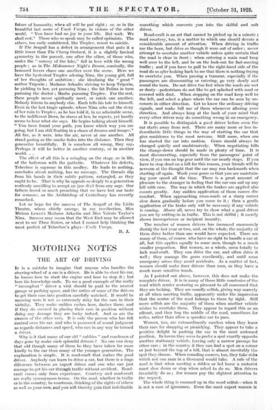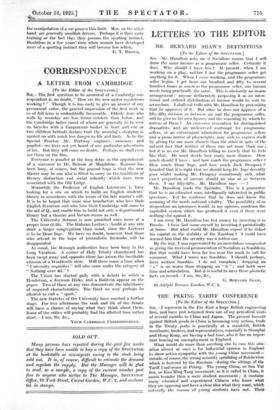MOTORING NOTES
THE ART OF DRIVING
Iv is a mistake to imagine that anyone who handles the steering-wheel of a car is a driver., He is able to steer his car, he knows how to start the engine and how to stop it ; but here his knowledge ends. To see a good example of the really " incompleat " driver a visit should be paid to the nearest garage or parking space, and the antics of some of the drivers to get their cars into position carefully watched. It would be amusing were it not so extremely risky for the cars in their vicinity. They make sudden rushes here, dashes there, and if they do succeed in placing their ears in position without doing any damage they are lucky indeed. And so are the owners of the other ears. it is only the person who has full control over his car, and who is possessed of sound judgrnent as regards distances and speed, who can in any way be termed a driver.
Why is it that many of our old " cabbies " and coachmen of days gone by make such splendid drivers ? No one can deny that old though many of them be they have taken far more kindly to the car than many of the younger generation. The explanation is simple. It is road-craft that makes the good driver. Anybody Can learn to drive a car, but there is a huge difference between an expert driver and one who can just manage to get his car through traffic without accident. Road- craft comes only from experience. Courtesy and road-craft are really synonymous terms. On the road, whether in traffic or in the country, be courteous, thinking of the rights of others as well as your own, and you will thereby gain that indefinable
something which converts you into the skilful and safe driver.
Road-craft is an art that cannot be picked up in a minute ; road courtesy, too, is a matter to which one should devote a considerable amount of attention. When driving in traffic use the horn, but drive as though it were out of order ; never attempt to overtake another vehicle unless quite certain that the road is clear in front ; when entering a main road keep well over to the left, and be on the look-out for fast-moving traffic ; and if you have to pull to the right-hand side of the
road do so after looking back to see that there is nothing trying
to overtake you. When passing a tramcar, especially if the passengers are dismounting or entering, go very slowly and sound the horn. Do not drive too fast when the roads are wet or dusty—pedestrians do not like to get splashed with mud or covered with dust. When stopping on the road keep well to the left, and select a place where the car can be seen by on- corners in either direction. Get to know the ordinary driving signals, and make full use of them whenever altering your direction. And always keep at the back of your mind that
every other driver may do something wrong in an emergency. It is possible to distinguish a good driver before even the car starts away from rest. There are many more or less in-
describable little things in the way of starting the' car that
give confidence to the most nervous. Still more, when one has started the car into motion. - Gears should- always be
changed quietly and unobtrusively. When negotiating hills the change-down should be made in plenty of time. It is most disconcerting, especially from the passengers' point of view, if you run on top gear until the car nearly stops. If you have to stop dead on a hill for this reason, your friends will be nervous at the thought that the car may run backwards when starting off again. Work your gears so that you are maintain- ing your speed all the time. There is a great amount of pleasure to the stranger in feeling that the car can sail up any hill with ease. The way in which the brakes are applied also counts greatly. Any sudden application of them causes dis- comfort. When approaching cross-roads or a sharp corner
slow down gradually before you come to it ; then a gentle application of the brake only will be necessary_ if any vehicle is' coming. Above all, never try to show what a good driver you are by cutting-in in traffic. This is not skilful ; it merely, shows incompetence or incipient insanity.
The number of women drivers has increased enormously durirfg the last year or two, arid, on the whole, the majority of them drive better than one would have expected. There are many of them, of course, who have no right to handle a car at all, but this applies equally to some men, though to a much smaller proportion. But women, as a whole, seem totally to lack road-craft. They can drive the car, and often drive it well ; they manage the gears excellently, and until some emergency arises they avoid accidents. As a matter of fact, women should make finer drivers than men, as they have a much more sensitive touch.
As I pointed out above, however, this does not make the 'complete driver. It is in many of those little courtesies of the
road which render motoring so pleasant to all concerned that they are lacking. They are usually selfish, giving way scarcely at all when meeting traffic, apparently under the impression
that the centre of the road belongs to them by right. Still more selfish, are the majority of them when another vehicle wishes to overtake them. They appear to regard this as an affront, and they hug the middle of the road, sometimes for miles, rather than allow a speedier ear to pass.
Women, too, are extraordinarily careless when they leave their cars for shopping or picnicking. They appear to take a' positive delight in parking the car in the most awkward position. In towns they seem to prefer a spot exactly opposite another stationary vehicle, leaving only a narrow passage for other cars ; in the country if they can find a spot on a corner or just beyond the top of a hill, that is almost inevitably the spot they choose. When rounding corners, too, they take risks
which not one man in a thousand would take. A rule of the road is that when meeting a ridden or led horse a, motorist must slow down or stop when asked to do so. Men drivers invariably do so ; few women pay the slightest attention to the request.
The whole thing is summed up in the word selfish—when it is not a case of ignorance. Even the most expert women in the manipulation of a car possess this fault. Men, on the other band, are generally unselfish drivers. Perhaps it is their early training or the fact that they possess the sporting instinct. Doubtless in a few years' time when women have developed more of a sporting instinct they will become less selfish.
E. T. BROWN.































































 Previous page
Previous page